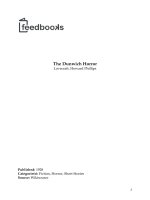The Dark Visitor By Scott J. Henderson pptx
Bạn đang xem bản rút gọn của tài liệu. Xem và tải ngay bản đầy đủ của tài liệu tại đây (6.33 MB, 149 trang )
ii
iii
iv
The Dark Visitor
By Scott J. Henderson
October 2007
The Dark Visitor: Copyright © 2007 by Scott Henderson. All rights
reserved. No part of this book may be used or reproduced in any
manner whatsoever without written permission except in the case of
brief quotations embodied in critical articles or reviews.
First Edition
Library of Congress Catalogoing-in-Publication has been applied for.
vi
About the Cover
The cover design, by Mr. Charles A. Martinson III, is a composite
consisting of three major elements: the rendering of an ancient Chinese
copper helmet; the opera mask of Jiang Wei; and computer circuitry. The
combination is a blending of ancient and modern that attempts to capture the
character and nature of the Red Hacker Alliance. It depicts the competing
elements that superimpose themselves over the lives of these young
nationalists and how it shapes their future.
The helmet represents the spirit of the warrior and the hackers’ belief
that they are the acting in defense of their nation. It is also meant to convey
the idea of cultural traits passing from one generation to the next, the old
transforming and reawakening anew.
The opera mask of Jiang Wei was used for similarities in character.
Jiang Wei was a commander of the Shu Army and considered one of the
greatest men of the Three Kingdoms era. His mentor, Zhuge, was so fond of
him that he bequeathed him all of his books on strategy.
1
Jiang Wei was
thought to have special knowledge of the universe that melds with the Red
Hacker Alliance’s understanding of the cyber world. The color blue was
added to the mask to bring in the
attributes of fierceness; the color red already
1
vii
present in the mask for loyalty, symbolizing nationalism; and white, the
element of deceit that exists in the darker intent of their intrusions.
2
The infusion of circuitry and binary numbers shows the extent of their
immersion in a world in which many of us are unfamiliar. This extreme
devotion to an alternate realm brings easily to mind the stuff of movies, the
combination of man and machine the cyborg
.
2
The attributes assigned to the colors are based off those given by the Beijing Opera
and thus may seem out of sync with traditional Western ideas.
viii
Contents
Acknowledgements……………………….……………… …….…… 1
Preface……………………………………….…………… …… … 2
Chinese Hacker Timeline………………………………………………6
Chapter One: History………….……………………………… … 8
Beginning and Expansion (1994-1996)………………….… 11
Green Army Founded (1997)……………….… ……… … 12
China Eagle Early Years (1997)
……………………… … 14
Leaps, Horses, and Riots (1998)…………………….….…….15
Indonesian Riots (1998)…………….…………………….…. 16
Birth of Commercialism (1999)………………………………20
Taiwan “Two-States” Conflict (1999)……… …… ……….20
Japanese Denial of Nanjing Massacre (2000)…………… ….22
Taiwan Election (2000)………………… ………………… 25
China Eagle Founded (2000) …… ……….…………… ….32
Honker Union Founded (2000)………………….……………35
Javaphile Founded (2000)……………………………………36
Japanese Incidents (2001)………………………………….…38
Japanese War Memorial (2001)…………………
…….…… 40
Diaoyu Islands Conflict (2004)……………………………….41
Honker Union Disbands (2004)………………………………42
Chapter Two: Chinese Hacker Present Day…………… …… …… 51
Methodology…………………… …… …….………………52
Net Hierarchy …… ………………………………………….57
Numbers Game… ……………… ……………….…… …58
Demographics……… …………………………… ……… 62
Location, Location, Location………………… …………….62
Who They Are, What They Are…………… …………….…66
Friendly Download Site…………… ………………… 66
New Hacker Alliance………………………….………………69
Student Hacker Union…………………………………… …72
ix
Yaqu163………………………
….……………………………74
Hx99………………………………………………………… 76
Chapter Three: Exploits and Money ……… ………………… …79
Wooden Horse…………………………………………… 79
Korean Game Theft……………………………………… 82
eBay Hijacked…………………………… …………………86
Bank Fraud…………………………………………… …… 87
Blackmail………… ……………………………………… 88
Musical Hacks……………………………………………… 90
Hacking for Fame and Fortune…………………………… 92
Publish or Perish……………………… ……………… … 93
It Pays to Advertise………………………………………… 94
Pornography………………………………………………… 97
Chapter Four: Government Affiliation……… ………… ……….102
Black and White Do Not Exist………………………… … 102
Intelligence and Economics……….…………
……….….… 105
Political……………………………………………… ……108
Recruiting…………………… ……………………….…….112
Communications…………………………………………….118
Appendix I. Hacker Terminology…………………….…… 122
Appendix II. List of All Hacker Web sites in Study……… ….131
Index…………………………………………………………………137
1
Acknowledgements
Thanks to the extreme patience and support of Dr. Jacob Kipp and Mr.
Karl Prinslow, I have been able to spend the last year living inside of and
studying the world of Chinese hackers. It has been the opportunity of a
lifetime and one that would have been impossible without their belief in the
project.
My heartfelt appreciation goes out to Mrs. Susan Craig, Dr. Geoff
Demarest, and Mr. Tim Thomas for taking the time to edit this manuscript.
For those attempting their first book, the best recommendation I can make is
to find the brightest group of people you can to review, critic, and evaluate the
work.
To Mr. Hommy Rosado and Mr. Kevin Freese, bless you for giving
so freely of your technical knowledge and not throwing me off a cliff for
constantly asking, “Could you please explain that to me just one more time?”
Without their guidance in this area, the embarrassments would have been too
numerous to mention.
Mr. Merle Miyasato, simple words alone are insufficient in
expressing my gratitude for all you have done to contribute to this work.
Your tireless efforts in assisting with the research are greatly appreciated but I
thank you most of all for your friendship.
For my father and mother, J.B. and Irene Henderson, you two have
always been my bedrock and strength. The examples you have set and the
guidance you have given me all my life have been invaluable. I just pray that
I am able to set those same fine examples for my family.
Finally, to my wife Li-Yun and daughter Jade, being able to
experience all that life has to offer with the two of you is the greatest joy of
my life. The accomplishments would mean nothing if I did not have such a
beautiful wife and darling daughter to share them with. Jade, this book is
dedicated to you, there is never a day that goes by that I don’t thank God for
letting me view the world renewed through your eyes.
2
Preface
This book attempts to analyze the history, ideology, organization,
exploits, and political motivations of the Chinese hacker network. Whenever
possible, the information contained herein has been taken directly from the
Chinese hacker organization itself or from interviews with individual
members.
During the course of this research several interesting questions have
arisen, one being, does the idea of national sovereignty include cyber
sovereignty? While there are many definitions of sovereignty, most include
the description, in one form or another, of the absolute power, right, or
authority of the state to govern the territory within its borders.
3
In essence,
the state owns or controls what happens inside the nation. The key word that
appears to be missing in all of these definitions is the ability to exercise
authority. If one accepts the premise that it is the right, combined with the
ability of a nation to control its internal workings that define sovereignty, then
is there a loss of sovereignty when the state fails in either of these two
capacities? Specifically, can there be cyber sovereignty if we cannot secure
our digital borders?
With the onslaught of hackers from other nations breaching the
firewalls with impunity, how can we retain uncontested ownership? One
method is to rely on the cooperation of other nations to mutually assist in the
enforcement of laws related to Internet crime. What if, on the other hand, the
nation in question provides tacit, if not active support of these attacks? What
recourse is then available to combat these assaults? The Chinese hacker
network presents just such a dilemma and can easily be viewed as a threat to
US infrastructure, security, information, economics, and individual citizens.
One of the unique aspects of the Chinese hacker organization is their
nationalism, which is in stark contrast to the loner/anarchist culture many
associate with the stereotypical Western hacker. They are especially active
during periods of political conflict with other nations and until very recently
have maintained a strict code of never hacking inside China. Their sense of
patriotism in defending their national honor and their stringent codes have
3
Multiple definitions supplied by Answer.com, as downloaded on 8 August 2005,
3
helped bolster their reputation among the Chinese people and aided in
recruiting thousands of members. Indeed, a strong argument can be made that
it was political activism that initially brought the group together. A central
question surrounding the organization is what type of relationship/affiliation if
any it has with the government? Is it an officially authorized apparatus of the
state or is it merely used as a surrogate to enforce Beijing’s political view?
Are there two groups working inside China, one a civilian organization and
the other a branch of the People’s Liberation Army? Is it possible that they
work in conjunction with one another or does the civilian organization serve
as a cover to disguise military operations?
The next most important series of questions that need to be answered
concern the connection of the group to criminal activities. Is this the same set
of Chinese hackers that media headlines claim are involved in Internet crimes
such as phishing,
4
pharming,
5
and blackmail? How are they financed? Is
there a darker side to this seemingly patriotic group?
Honker vs. Red Hacker Alliance
The organization of Chinese hackers is often referred to as the Honker
Union of China by most open-source reporting to include the Chinese
themselves. This report will instead refer to the organization as the “Red
Hacker Alliance” as it is in the author’s opinion, truer to the original Chinese.
Hopefully, this will not cause confusion for those readers who are familiar
with the subject matter and accustomed to seeing the organization referred to
as the Honker Union of China. There are three main reasons for this shift
away from the term Honker:
4
In computing, phishing is a form of social engineering, characterised by attempts to
fraudulently acquire sensitive information, such as passwords and credit card details,
by masquerading as a trustworthy person or business in an apparently official
electronic communication, such as an email or an instant message. The term phishing
arises from the use of increasingly sophisticated lures to "fish" for users' financial
information and passwords. Definition supplied by Wikipedia
5
Pharming is the exploitation of a vulnerability in the DNS server software that
allows a hacker to acquire the Domain Name for a site, and to redirect traffic there
and then to another web site. DNS servers are the machines responsible for resolving
Internet names into their real addresses - the "signposts" of the Internet. Definition
supplied by Wikipedia
4
1) The term Honker has little or no meaning in the English language. It
can refer to a person who honks a horn; a slang term for the nose; or a goose.
6
None of these definitions apply. Furthermore, it fails to provide the average
Western reader with the undertones contained in the Chinese characters.
2) The Chinese use a combination of two characters to form a
transliteration of the English word hacker. The first is 6 (pronounced the
same as the English word hay) and the second is Ҙ (pronounced the same as
the hard C sound in could). The character 6 means “dark” or “black” and the
character Ҙ means “visitor” or “guest”. So in Chinese, hacker is represented
as 6Ҙ, or the “dark visitor.” There is a Romanization system developed to
assist non-native speakers learn Chinese, called Pinyin, that assists in forming
the sounds for these characters. In Pinyin, 6Ҙ is written as Heike. Chinese
hackers later decided to change the 6 to ඔ, which means “red” and is written
in Pinyin as Hong. Thus, the group’s name became ඔҘ (Hongke). The term
Honker is probably derived from a contraction of the Pinyin Hongke to
Honker. The use of the Pinyin in this instance does not convey the true
meaning of the characters. Substituting the color Red for Honker in the title
also gives it a more patriotic feel to the translation that is much closer to the
meaning and expresses the ideology of the alliance.
3) Adding more confusion to the term Honker is the way in which it has
been applied over time. Initially, it seems to have been used to describe all
the associated groups and individuals making up the alliance and may have
actually been an umbrella moniker for this loose association. As the nature of
the group took on greater form and substance, it became tied to one set in the
group more than the others. To suggest that there is only one group is
inaccurate. It is certainly an alliance, but it is an alliance of independent
groups and not subject to the dictates of an individual leader or organization.
Think of it as the evolution of a rock band. We will call it the “John Smith”
Band. In the beginning the name covers all members and is simply billed as
the John Smith Band. However, as time goes on and the lead singer, who we
will call Tony (Honker Union of China), moves into the spotlight and gets
greater press coverage, the band is now billed as “Tony and the John Smith
Band.” More time elapses, Tony’s popularity increases and now the entire
6
Definitions supplied by Wordnet as downloaded on 24 Jan 06 from
wordnet.princeton.edu/perl/webwn
5
group headlines as “Tony.” This is what appears to have happened with the
Red Hacker Alliance.
NOTE: In this text, when the reader sees the term Honker Union of China it
refers to only the one web site and its associated members, not the larger
organization. When referring to the collection of all web sites the term Red
Hacker Alliance will be used.
When asked to give a distinction between regular hackers and Red
Hackers, the “Godfather”
7
of Chinese hacking gave the following explanation:
“Years ago, it was OK to be a hacker, when it simply referred to
someone who would break into systems. But over the past decade,
the attributes of hackers have become somewhat darker. Chinese
hackers coined the word "Red Hacker", which means someone's a
patriotic hacker. Unlike our Western counterparts, most of who are
individualists or anarchists, Chinese hackers tend to get more
involved with politics because most of them are young, passionate
and patriotic. Most of them are politically motivated, as they need a
way to protest against foreign matters. There's a lack of such an
outlet in real Chinese society.”
8
7
While not named in the article, the “Godfather” probably refers to a man named
Wan Tao, the leader of China Eagle Union who will be discussed later. Wan Tao has
been dubbed the “Godfather” of Chinese hackers in other articles.
8
Vivien Cui, “'Godfather' of hackers fights for Web security”, Hong Kong Sunday
Morning Post, 29 May 05, as translated by FBIS reference CPP20050530000043
6
Chinese Hacker Historic Timeline
Year Major Incidents
1994-
1996
Formation, Expansion, and Exploration
1997 1) The Green Army (China’s first hacker group) is formed
2) China Eagle Union’s preliminary web site registered as
Chinawill and titled “Voice of the Dragon”
1998 Anti-Chinese riots in Indonesia ignite retaliation from Chinese
hackers and provide the catalyst for the creation of the Red
Hacker Alliance
1999 1) Cyber conflict between People’s Republic of China and
Taiwan over “Two-States-Theory”
2) Commercialism is introduced into the Green Army
2000 1) Denial of Nanjing Massacre leads to attacks on Japanese
web sites
2) Taiwanese elections sparks conflict with mainland hackers
3) Beginning of “reckless desires” within the alliance
4) The Green Army falls apart over financial dispute
5) Honker Union of China founded by Lion
6) China Eagle Union founded by Wan Tao
7) Javaphile founded by Coolswallow and Blhuang
2001 1) The Red Hacker Alliance attacks Japan over “incidents”
2) Japanese web sites hit over Prime Minister’s visit to
controversial war memorial
2002 Attack on Taiwanese company Lite-On by Javaphile
2004 1) Chinese hackers hit Japanese government sites over disputed
Diaoyu Islands
2) Lion announces the disbandment of the Honker Union of
China
2005 Honker Union of China reforms
7
Definition of Red Hacker Alliance: A Chinese nationalist
hacker network, made up of many independent web sites directly
linked to one another in which individual sites educate their
members on computer attack and intrusion techniques. The group
is characterized by launching coordinated attacks against foreign
governments and entities to protest actual and perceived injustices
done to their nation. There is a growing trend that suggests
monetary motivations are becoming as important as patriotic
passion.
Criteria for Designating a Web site as a Member of the Red
Hacker Alliance: An individual web site is designated as a
member of the Red Hacker Alliance based off of the design,
function, and content of its webpages. While they share many
similar characteristics, three key elements must be present for
inclusion in the Alliance:
1) The primary function is to teach individual members
computer attack and intrusion techniques
2) Must have an active membership architecture that allows
new members to sign up, post articles, and exchange
information internally
3) The site must be connected by hyper-links to one or more
members of the alliance
8
Chapter 1
Chinese Hacker History
Ƒ6Ҙ_
From Nationalism to Commercialism
The headlines in most major papers that
cover Chinese hackers paint them as ethereal
beings, invisible, coming from nowhere, invading,
attacking, and then returning to their void. Media
reports are filled with “Chinese hackers”
involvement in one type of exploit or another,
speculations about government affiliation, and the
types of online crimes they have committed.
What they fail to provide is background on just
who comprises this secretive organization.
Certainly, these spirits from a land as
unfathomable as China must be impossible to
locate, much less study. The reality turns out to be considerably less
mysterious and much more mundane. Chinese hackers are incredibly easy to
find and provide more information about themselves than anyone reading the
news could imagine. The problem is not a lack of information but an
overabundance of it. The Red Hacker Alliance is producing thousands of
internal documents just waiting to be translated and studied. No special
computer skills are required and you do not need the ability to detect and
track an intruder over countless Internet connections or jumps between
satellites. It doesn’t require a government clearance with access to classified
documents. The information has been sitting in the open since the very
founding of the organization and it is this very information we will use to
examine their history, structure, exploits, political agenda, and possible
government affiliations.
While not an unbroken historic timeline, we will trace the birth of
Chinese hackers on the Internet from a purely nationalistic organization, to
their current situation that is rapidly expanding into commercialization and
criminal activity. Before looking directly at the history of the Chinese Red
Hacker Alliance, it is perhaps vital that we have an understanding of China’s
past and how it affects its population’s current psyche in order to get greater
Depiction of the 250+ web
sites making up this study of
the Chinese hacker network
9
insight into why these groups are so much more nationalistic than their
Western counterparts.
Historically, China has endured numerous outside threats to its
sovereignty and what it views as insults to national honor. This has perhaps
produced a mindset more sensitive to actual and perceived injustices. Having
the ability to protest against these humiliations, as is the case with Chinese
hackers, must be a very potent source of empowerment. The majority of the
alliance is comprised of males in their 20’s that hold the passions of youth.
Being somewhat prohibited from protesting against their own society’s
injustices, they are quick to retaliate against both major and minor offenses
from outside sources. William Callahan’s work on the rise of Chinese
nationalism stemming from the “Century of Humiliation” provides a very
detailed look at these motivators pushing the rise of nationalism:
“Chinese nationalism is not just about celebrating the glories of
Chinese civilization; it also commemorates China’s weakness. This
negative image comes out most directly in the discourse of China’s
Century of National Humiliation (Bainian guochi). Chinese books
on the topic generally tell the tale of China going from being at the
center of the world to being the Sick Man of Asia after the Opium
War (1840), only to rise again with the Communist Revolution
(1949). To understand how Chinese nationalism works, we need to
reverse Paul Kennedy’s famous thesis about ‘the rise and fall of the
great powers’ to examine the ‘fall and rise’ of China: Many of the
titles of these books include the phrase ‘from humiliation to glory.’
The discourse of national humiliation shows how China’s
insecurities are not just material, a matter of catching up to the West
militarily and economically, but symbolic. Indeed, one of the goals
of Chinese foreign policy has been to ‘cleanse National
Humiliation.’”
9
Indeed this very sentiment was reflected to near perfection on the web site
Iron and Blood Union, which is linked to several of the Red Hacker Alliance
web sites. They articulated their philosophy as follows:
9
William A. Callahan, “National Insecurities: Humiliation, Salvation, and Chinese
Nationalism,” Centre for Contemporary Chinese Studies, Department of Politics,
University of Durham, Durham, UK, 2004, as downloaded on 24 Aug 2005 from
10
“The goal of this community: Is to grieve for the prior generation
and to never forget the nation’s shame; to use history as an
example for facing the future.”
10
While the case can be made that the government has the ability to fan
the flames of patriotic zeal inside the Red Hacker Alliance, it is apparent that
it already exists within the group and is not fabricated. It is also doubtful that
the Chinese government is overly enthusiastic about causing major unrest in
large numbers of students, who comprise a substantial portion of the hacker
organization. Student led demonstrations during the May 4
th
Movement of
1919 and Tiananmen Square in 1989 are deeply ingrained in their memory.
The case can also be made that nationalism provides a certain shield against
government scrutiny and possible interference. By Chinese government
standards, this is a large group of individuals with common ties that are not
easily monitored or controlled. If the Chinese hacker alliance did not set very
strict internal guidelines or failed to clearly show its support of the
government/people, it might quickly find itself censored and broken apart.
The political activist nature of the groups making up the alliance has also
bolstered their reputation within China and may have perpetuated their
nationalistic character.
11
CAUTION: The historical account that follows has been primarily pieced
together from documents obtained off of Red Hacker web sites
and expresses
their perspective on how events began and unfolded. This note of caution
should not and is not intended to cause the reader to discount the Chinese
rendering of events. To the contrary, the descriptions they provide are quite
compelling and introspective. As with any story, there is always the
possibility of exaggeration and misinformation (not to be confused with
disinformation
12
). The major sin that may have been committed would be that
10
Iron and Blood is a military enthusiast site but has links to the Red Hacker Alliance.
It is also heavily anti-Japanese.
11
Unknown, “The Growth of the Chinese Computer Hacker,” KKER Union of China,
20 Nov 2004, as downloaded on 23 Aug 2005 from
12
Disinformation: in the context of espionage, military intelligence, and propaganda,
is the spreading of deliberately false information to mislead an enemy as to one's
position or course of action. It also includes the distortion of true information in such
a way as to render it useless. Definition supplied by Wikipedia
11
of omission and not commission. The Chinese hackers have presented us
with the portion of their history that shows the strong patriotic side of the
alliance and has chosen to delete that portion that did not. When deemed
appropriate, comments and analysis have been added.
The Beginning and Expansion
(1994-1996)
According to Chu Tianbi, the author of Chinese Hacker
History/Looking Back on the Chinese Hacker History, the origin of Chinese
hacking began in 1994 when the Internet was first made available to the
public. Chu describes this as a period of familiarization, when even the term
“Internet” was not widely understood by the general populace and related
terminology was only found in “highly specialized publications.”
13
Even with
the opening up of the Internet, access was primarily confined to “science and
technology research personnel” and “rich young people.” Users operated off
of 9,600 bit/second modems and dialed directly into Bulletin Board System
(BBS) servers. The programs they were exposed to fascinated Chinese users
who immediately began to decode them. The year 1995 marked an escape
from the dialup BBS, as mid-sized cities in China began to provide Internet
portals. Chu Tianbi captures this preliminary step by stating:
“In their view, moving from BBS to the Internet was an expansion
of their stage and allowed them to see a bit more.”
14
Chu also tells us that this period was discernible by a rapid acceleration in
technical skills for the Chinese “crackers.”
15
One of the most famous crackers
13
Chu Tianbi, “Chinese Hacker History/Looking Back on Chinese Hacker History,”
Blog China News, as downloaded on 9 Aug 2005 from
14
Ibid
15
Cracker - An individual who attempts to gain unauthorized access to a computer
system. These individuals are often malicious and have many means at their disposal
for breaking into a system. Crackers often like to describe themselves as hackers.
Cracking does not usually involve some mysterious leap of hackerly brilliance but
rather persistence and repetition of a handful of fairly well known tricks that exploit
common weaknesses in the security of target systems. Definition supplied by
www.infosec.gov.hk/english/general/glossary.htm
12
during this time was Gao Chunhui,
16
whose homepage, dedicated to cracking
software codes and registration codes, received the largest number of hits in
China for that time period. In 1996, favorable Internet policy shifts by China
Telecom brought the Internet into the homes of ordinary Chinese.
The
Green Army
Founded
(1997)
In 1997, there were only seven rudimentary Chinese hacker web sites
and the contents contained in them were primarily copied from overseas.
Indigenously produced attack methods were almost nonexistent during this
time and most Chinese hackers relied on e-mail bombs supplied in
prepackaged toolkits.
17
The year 1997 also saw the establishment of the
Green Army, sometimes referred to as the “Whampoa Military Academy,”
claimed to be one of China’s earliest hacker organizations. The Green Army
took on the nickname Whampoa Academy in tribute to the original academy
established in 1924 as a training facility for Chinese military officers by Dr.
Sun Yat-sen and the Communist Party of China. Funding for the training
facility was provided by the former Soviet Union.
18
16
According to an article posted on the site ITHACK, Gao Chunhui was born in
March of 1975 in Liaoning Province.
The originator of the article is
not cited.
17
Unknown, “The Growth of the Chinese Computer Hacker,” KKER Union of China,
20 Nov 2004, as downloaded on 23 Aug 2005 from
18
History and photo of the Whampoa Military Academy downloaded from the
Guangdong University of Technology web site.
13
The Green Army was founded by a Shanghai hacker going by the
online name of Goodwill,
19
it was reported to have had a membership of
around 3,000 people from Shanghai, Beijing, and Shijiazhuang. The other
four key members of the group went by the pseudonyms Rocky
20
, Dspman
(HeHe), Solo, and LittleFish. It also attracted others, considered to be part of
China’s first generation hackers, the likes of Xie Zhaoxia, Brother Peng, PP
(Peng Quan), Tian Xing (Cheng Weishan), IceWater (Huang Lei), and Little
Rong. The group disbanded in 2000 and its rise and fall was described as
“confusing” by insiders who consider it one of the enduring symbols of the
Chinese hacker movement. The Green Army is said to have hacked
“uncountable foreign web sites.” Indeed, many of China’s top hackers were
past members of this group.
21
19
Goodwill has also been rendered as Goodwell and Goodwel. All versions could be
possible transliterations of the Chinese characters Ȭ (Gong and Wei) reported to
be the founder’s true surname. Photo of Goodwill downloaded from China Eagle
web site on 8 Feb 06 /> The picture refers to
him as Goodwell.
20
Rocky was later killed in a traffic accident
21
Li Zi, “The Chinese Hacker Evolution,” Times Weekly Personality Report, 10 Mar
2005, downloaded on 9 Aug 2005 from
Gate at Huangpu Leading into the
Whampoa Military Academy,
now a tourist site.
14
China Eagle Union
the Early Years
(1997)
This was also the “gestation period” for China Eagle Union, founded
by Wan Tao and currently one of the strongest groups active in the Red
Hacker Alliance. His site was initially registered under the name Chinawill
and titled “Voice of the Dragon.” Wan Tao’s views on this preliminary step
in the history of the China Eagle Union:
“I registered the international domain and space for CHINAWILL
way back on June 26, 1997, with a view to creating a web site for
investigating Chinese history and China’s future. The meaning of
CHINAWILL is: China’s will to be; China will be what; China will
be where. The name of the web site was “Voice of the Dragon,”
and had topics such as the dragon’s dreams and my love for my
family, etc. But I didn’t have sufficient experience, and due to
reasons such as a lack of help, the plan never came to fruition. But,
I believed that as the frequency of people going online went up
left unknown, center Wan Tao, right Goodwill
15
there would be more excellent participants coming in—China will
be great!”
22
Leaps, Horses, and Riots
(1998)
The year 1998 was considered the “Great Leap Forward” in Chinese
hacking and coincided with the US hacker group Cult of the Dead Cow’s
23
release of their Back Orifice program
24
and its source code. This software
was the catalyst that began the rapid use of the Trojan horse program as a
means of attack and its subsequent spread to Chinese hacker organizations.
However, Back Orifice itself did not become very popular in China for two
reasons: first, the network was still developing and second, Back Orifice was
a foreign product that was difficult for Chinese hackers to use. The release of
the CIH Virus
25
by a Taiwanese programmer also had a profound effect on the
mainland hackers. The CIH virus caused significant financial losses to the
Chinese nation and was viewed as an outside threat and attack on the
country.
26
Rumors circulated in China that it had been written by a “mentally
unstable” Taiwanese soldier that specifically targeted simplified Chinese
characters (the Taiwanese use traditional characters). Reports stated that
22
Unknown (the author is more than likely Wan Tao), Untitled, China Eagle,
downloaded on 8 Feb 06 from
23
Cult of the Dead Cow (cDc) is a high-profile computer hacker organization founded
in 1984 in Lubbock, Texas. Definition of organization supplied by wikipedia on 23
Aug 2005,
24
Back Orifice and Back Orifice 2000 (BO2k) are controversial computer programs
designed for remote system administration. They enable a user to control a computer
running the Microsoft Windows operating system from a remote location. The names
are a pun on Microsoft's BackOffice Server software. Definition supplied by
wikipedia on 23 Aug 2005,
25
CIH, also known as Chernobyl or Spacefiller, is a computer virus written by Chen
Ing Hau of Taiwan. It is considered to be one of the most harmful widely circulated
viruses, destroying all information on users' systems and in some cases overwriting
the system BIOS. Definition supplied by wikipedia on 23 Aug 2005,
26
Unknown, “The Growth of the Chinese Computer Hacker,” KKER Union of China,
20 Nov 2004, as downloaded on 23 Aug 2005 from
16
damages from the virus exceeded 1 Billion Renminbi (approximately US
$123 million).
27
The Indonesian Riots
(Cyber Conflict of 1998)
Up until this point, although groups were forming such as the Green
Army and communications were taking place between individuals, a unified
group or ideology binding these loose confederations of hackers had yet to
occur. The event that seems most responsible for coalescing these relatively
independent cells was the 1998 riots that occurred in Jakarta, Indonesia.
During this period, the Indonesian populace unfairly blamed their ethnic
Chinese community for the country’s out of control inflation. Indonesian
citizens turned on the Chinese living among them and commited murders,
rapes, and the destruction of their businesses.
28
While the incidents were not
reported in Chinese domestic news, the stories and pictures of the atrocities
were broadcast over the Internet and viewed by Chinese hackers.
29
Individual
outrage over the violence needed an outlet, which in turn caused an almost
spontaneous gathering of hacker groups in Internet Relay Chat (IRC)
30
rooms.
In retaliation for these ethnic attacks, the groups formed the “Chinese Hacker
Emergency Conference Center”
31
and worked in concert to send e-mail bombs
to Indonesian government web sites and mailboxes, while at the same time
27
“China: Information Security,” US Embassy China, Jun 99, downloaded on 9 Jan
06 from Exchange rate of
8.08 Renmenbi to the US dollar used for this calculation.
28
“Anti-Chinese riots continue in Indonesia,” CNN News CNN.com/World, 29 Aug
1998, as downloaded on 23 Aug 2005 from
29
Long San, “Let’s look back on the days of the Red Hacker Alliance,” Juntuan, 24
Oct 2005, as downloaded on 17 Nov 2005 from
30
Internet Relay Chat is a chat system that enables people connected anywhere on the
Internet to join in live discussions. To join an IRC discussion, you need an IRC client
and Internet access. Definition provided by www.saol.com/glossary.asp
31
There are differing accounts of the date this group was established. One of those
accounts claimed that the group was formed on 9 May 1999 in response to the
Chinese Embassy bombing. It is likely that during each of the incidents, a “Chinese
Hacker Emergency Conference Center” was established to assist in communications
among the groups.









